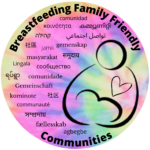Lactation support providers from Durham, Orange, Chatham, and Wake Counties in North Carolina recently met to discuss the landscape of lactation support in our communities, especially the gaps in care toward race equity, language equity, gender equity, and universal access. One important outcome of that discussion was a letter regarding an open International Board Certified Lactation Consultant (IBCLC) position at a local hospital. Thank you to Breastfeed Durham for sharing the letter and providing the opportunity to sign on in support.
The letter and community lactation support has prompted the local hospital to review its current job posting, reflecting a more equitable lens in hiring by removing the Registered Nurse credential from the IBCLC position. Replication of this model currently is under consideration in other communities.
The following was originally posted on the Breastfeed Durham website: https://breastfeeddurham.org/equity-in-the-ibclc-credential/ You can find updates at the Breastfeed Durham link, too.
On March 8, 2021, a group of community advocates requested that Breastfeed Durham and other community groups advocate for the IBCLC credential to be recognized by Duke Health and other surrounding hospitals as a standalone credential. After meeting with our team of lactation support providers and advocates in Durham County and the surrounding areas, we drafted the letter below.
Click HERE to add your name or your organization name
Dear Human Resources at [Hospital],
It has come to the attention of local lactation providers in Durham and the greater piedmont area that [Hospital], requires that IBCLCs (Internationally Board Certified Lactation Consultants) hold the additional license of Registered Nurse. We value [Hospital]‘s work to become more equitable and inclusive. Thank you for being willing to hear concerns and ensure leadership hears them too. As [Hospital], works to become a more equitable space for the community, we ask that the current policy be reconsidered. Requiring a concurrent RN license to perform IBCLC duties continues patterns of structural and institutional racism.
Breastfeeding is considered the “great equalizer,” providing infants with life-long better health outcomes as well as improving health outcomes for parents who human milk feed. The inequities that affect Black and Brown community-members in other health outcome measures, are also found in breastfeeding outcomes. The American Academy of Pediatrics (AAP) and World Health Organization (WHO) recommendations for exclusive breastfeeding for the first six months of life are not attained by the majority of families, especially Black and Brown families. The long history of slavery, settler colonization, criminalization of lay-midwives, and further historical trauma have certainly affected breastfeeding rates in the present; however, current practices such as [Hospital]’s education requirements only perpetuate the inequities.
Unequal access to higher education has led to disparities in who provides care in our community. 80% of RNs in North Carolina are white. Only 8% of NC RNs are Black. We live in a city where 38% of the population is Black and 13% is Latinx. Unreasonably restrictive and expensive requirements for the IBCLC certification have led to similar statistics in the lactation profession. 90% of IBCLCs are white. As Tamar Ringel-Kulka, MD, MPH notes in her 2011 study1, Black Durham parents cite bias from healthcare professionals and culturally incongruous care as affecting breastfeeding outcomes. Hiring Black and Latinx lactation providers is of utmost importance to decreasing inequities in breastfeeding outcomes in Durham.
Many hospitals in the area are utilizing more equitable hiring practices. Hospitals that don’t require an RN license for IBCLCs include UNC, Novant Health, Cone Health, and Atrium to name a few. We hope that [Hospital] will consider revising the current hiring policy to align with other leaders in healthcare across the state.
We look forward to continuing to work together to support families in the community. Please do not hesitate to reach out with any concerns or questions. Thank you.
Sincerely,
Member of the Durham Community
(click here to add your name or your organization name)
USLCA’s letter supporting IBCLC as a stand-only credential: https://uslca.org/wp-content/uploads/2020/02/Support-for-IBCLC-as-a-Standalone-Credential.pdf
1. Community based participatory research of breastfeeding disparities in African American women Infant Child Adolesc Nutr. 2011 Aug; 3(4): 233–239.
2. Enhancing Breastfeeding Through Healthcare Support: Results from a Focus Group Study of African American Mothers Matern Child Health J. 2016;20(Suppl 1):92-102. doi:10.1007/s10995-016-2085-y
